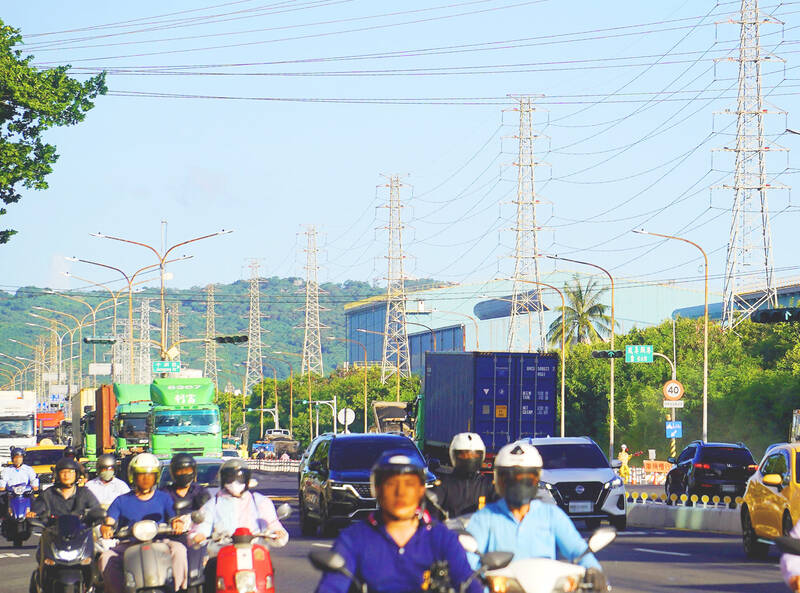Electricity consumption in Taiwan hit a record high of 41.18 gigawatts (GW) yesterday as scorching hot weather continued across the country, state-run Taiwan Power Co (Taipower) said.
The instantaneous peak load was recorded at 1:52pm, surpassing the previous record of 40.74GW set on July 22, 2022, and is close to Taipower’s estimated peak of 41.19GW for this year.
Taipower attributed the record high power demand to the muggy condition caused by the high humidity before rainfall, which boosted residential use of air-conditioning.

Photo: CNA
Temperatures yesterday in Yunlin County’s Dounan Township (斗南) hit 38.4 degrees Celsius, while temperatures higher than 37 degrees were recorded in other parts of central and southern Taiwan as well as Taipei’s Shezidao (社子島) area.
Meanwhile, the Central Weather Administration (CWA) issued an “orange” alert for Taipei, New Taipei City and Taichung, as well as some parts of central and southern Taiwan, meaning daytime highs in these areas could reach 36 degrees for three consecutive days.
Yesteday’s maximum power supply capability was 47.33GW, with an operating reserve of 16.86 percent, giving a green light that symbolizes “adequate power supply,” according to Taipower’s official Web site.
Taipower data showed the third-highest power consumption level was 40.66GW set on July 25, 2022, followed by 40.63GW and 40.57GW on June 21 and June 28 this year, respectively.
With more sources of solar power to be connected to the grid, Taipower said it expects operating reserves this month to remain at a healthy level of more than 10 percent during the day and 7 percent at night, within the “yellow” power supply range of 6-10 percent.
A yellow alert light means that the electricity supply is under constraint, the company said.

TAKING STOCK: A Taiwanese cookware firm in Vietnam urged customers to assess inventory or place orders early so shipments can reach the US while tariffs are paused Taiwanese businesses in Vietnam are exploring alternatives after the White House imposed a 46 percent import duty on Vietnamese goods, following US President Donald Trump’s announcement of “reciprocal” tariffs on the US’ trading partners. Lo Shih-liang (羅世良), chairman of Brico Industry Co (裕茂工業), a Taiwanese company that manufactures cast iron cookware and stove components in Vietnam, said that more than 40 percent of his business was tied to the US market, describing the constant US policy shifts as an emotional roller coaster. “I work during the day and stay up all night watching the news. I’ve been following US news until 3am

UNCERTAINTY: Innolux activated a stringent supply chain management mechanism, as it did during the COVID-19 pandemic, to ensure optimal inventory levels for customers Flat-panel display makers AUO Corp (友達) and Innolux Corp (群創) yesterday said that about 12 to 20 percent of their display business is at risk of potential US tariffs and that they would relocate production or shipment destinations to mitigate the levies’ effects. US tariffs would have a direct impact of US$200 million on AUO’s revenue, company chairman Paul Peng (彭雙浪) told reporters on the sidelines of the Touch Taiwan trade show in Taipei yesterday. That would make up about 12 percent of the company’s overall revenue. To cope with the tariff uncertainty, AUO plans to allocate its production to manufacturing facilities in

Six years ago, LVMH’s billionaire CEO Bernard Arnault and US President Donald Trump cut the blue ribbon on a factory in rural Texas that would make designer handbags for Louis Vuitton, one of the world’s best-known luxury brands. However, since the high-profile opening, the factory has faced a host of problems limiting production, 11 former Louis Vuitton employees said. The site has consistently ranked among the worst-performing for Louis Vuitton globally, “significantly” underperforming other facilities, said three former Louis Vuitton workers and a senior industry source, who cited internal rankings shared with staff. The plant’s problems — which have not

TARIFF CONCERNS: The chipmaker cited global uncertainty from US tariffs and a weakening economic outlook, but said its Singapore expansion remains on track Vanguard International Semiconductor Corp (世界先進), a foundry service provider specializing in producing power management and display driver chips, yesterday withdrew its full-year revenue projection of moderate growth for this year, as escalating US tariff tensions raised uncertainty and concern about a potential economic recession. The Hsinchu-based chipmaker in February said revenues this year would grow mildly from last year based on improving supply chain inventory levels and market demand. At the time, it also anticipated gradual quarter revenue growth. However, the US’ sweeping tariff policy has upended the industry’s supply chains and weakened economic prospects for the world economy, it said. “Now